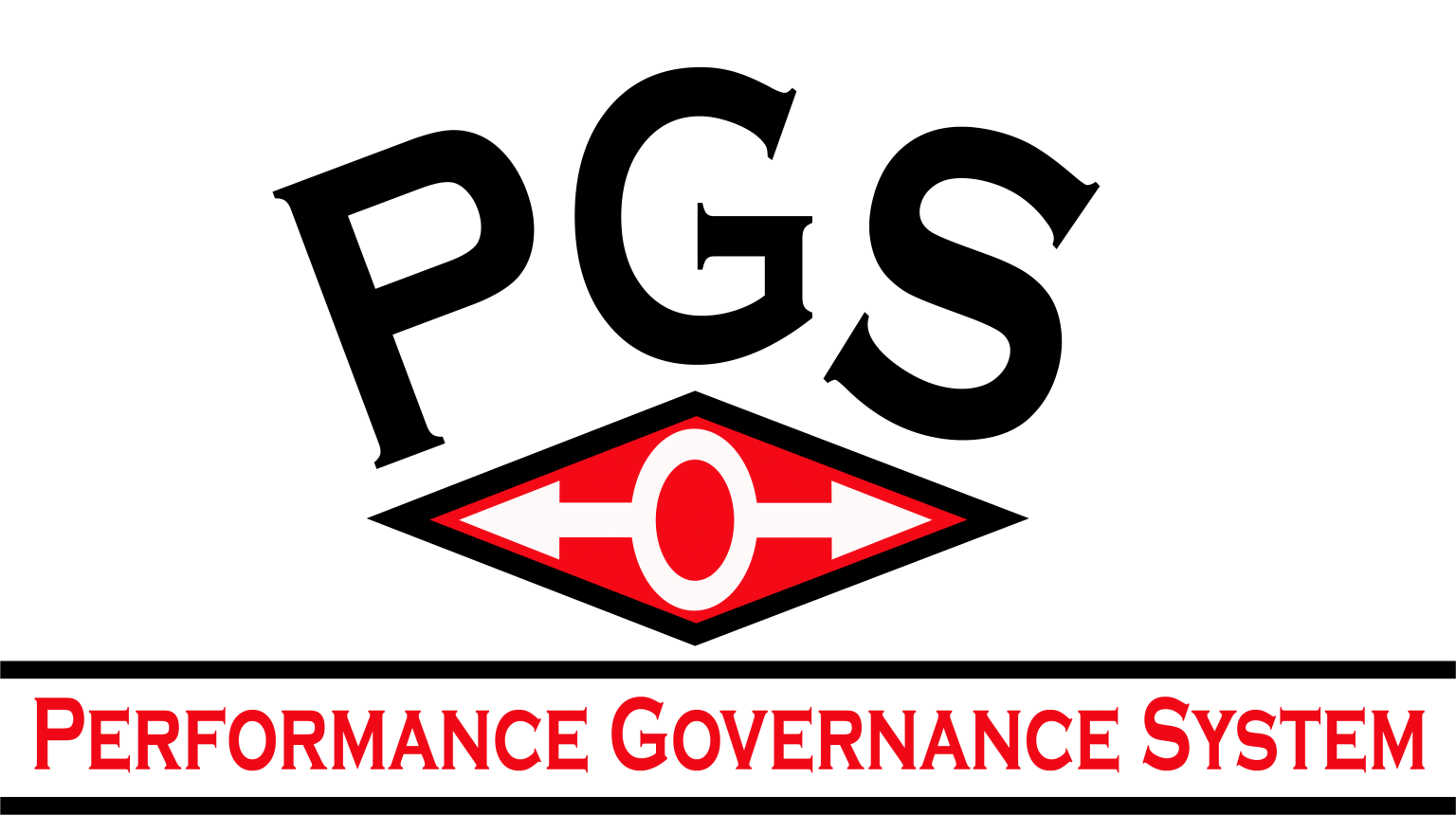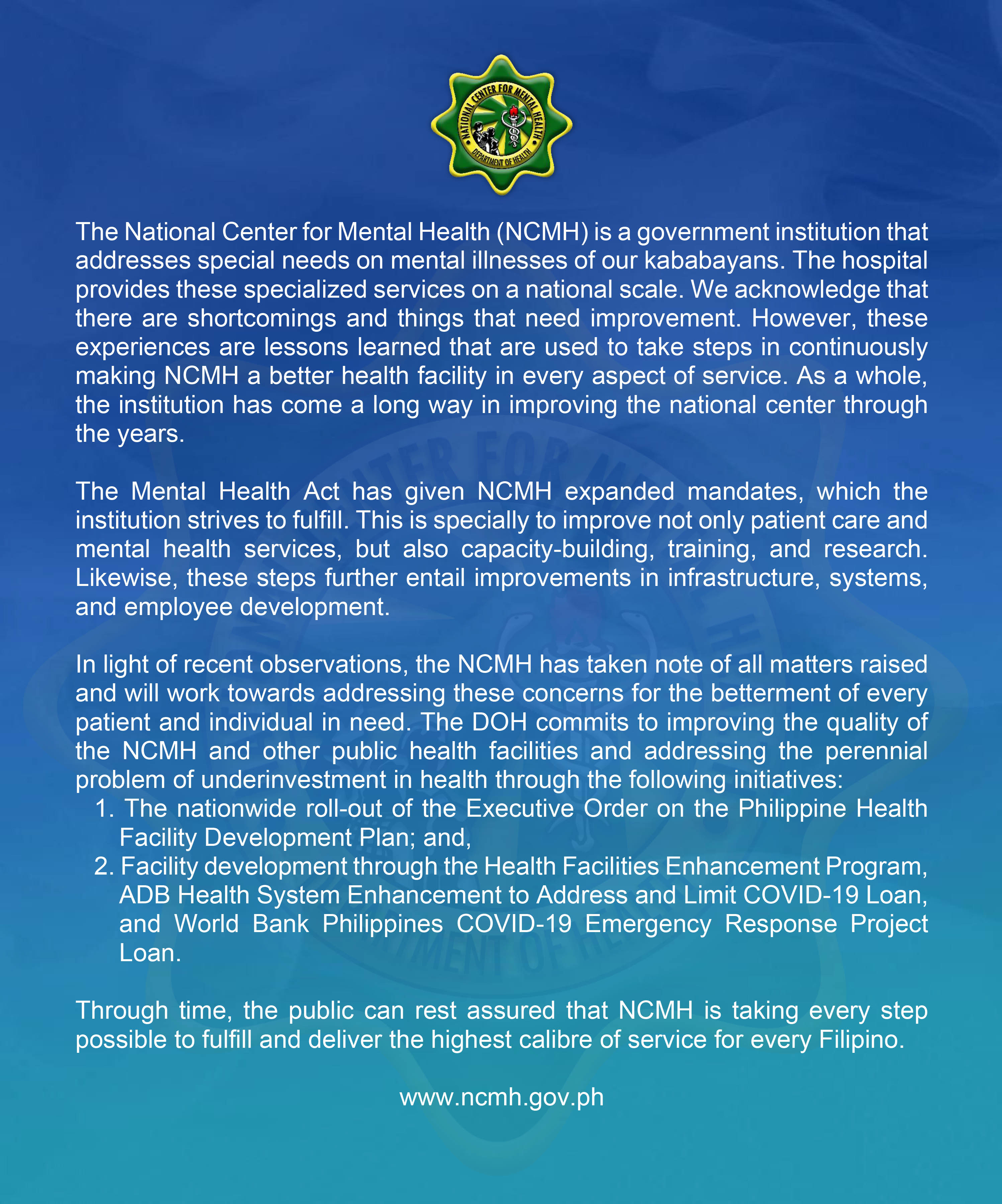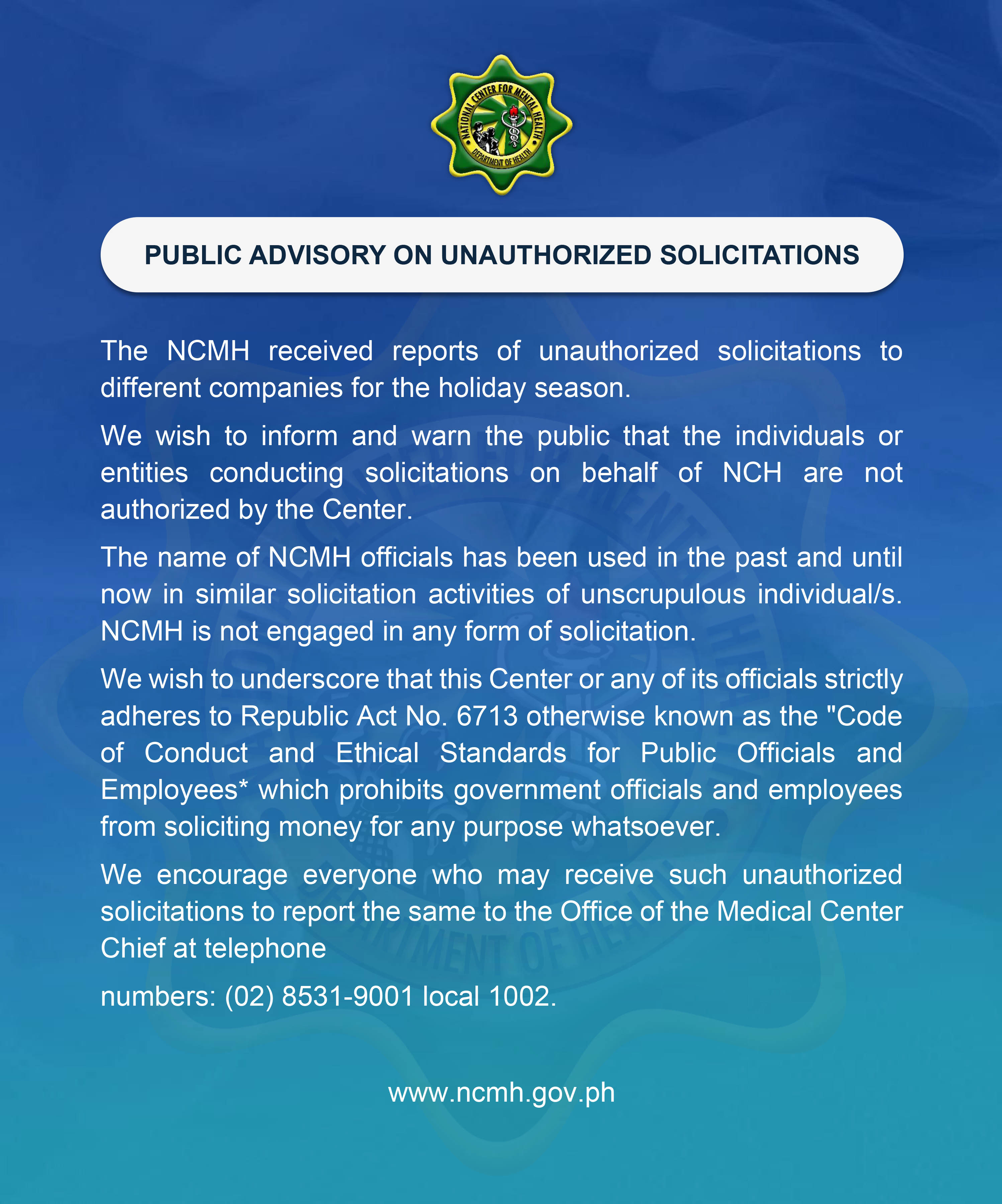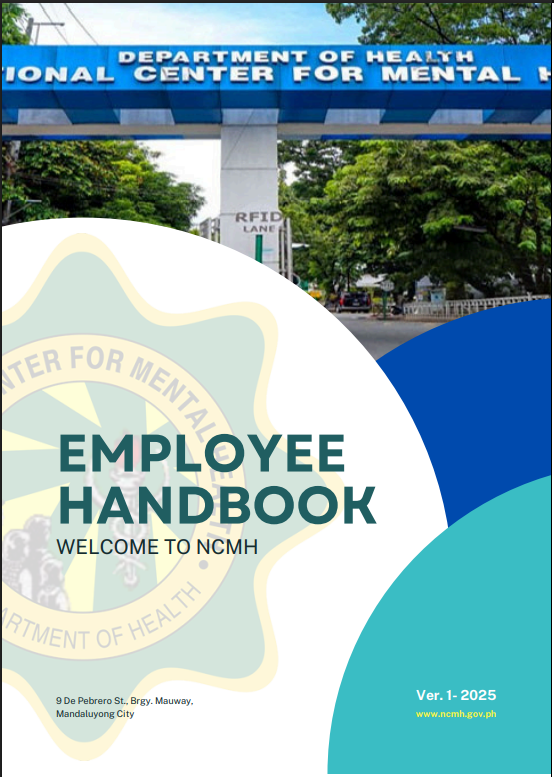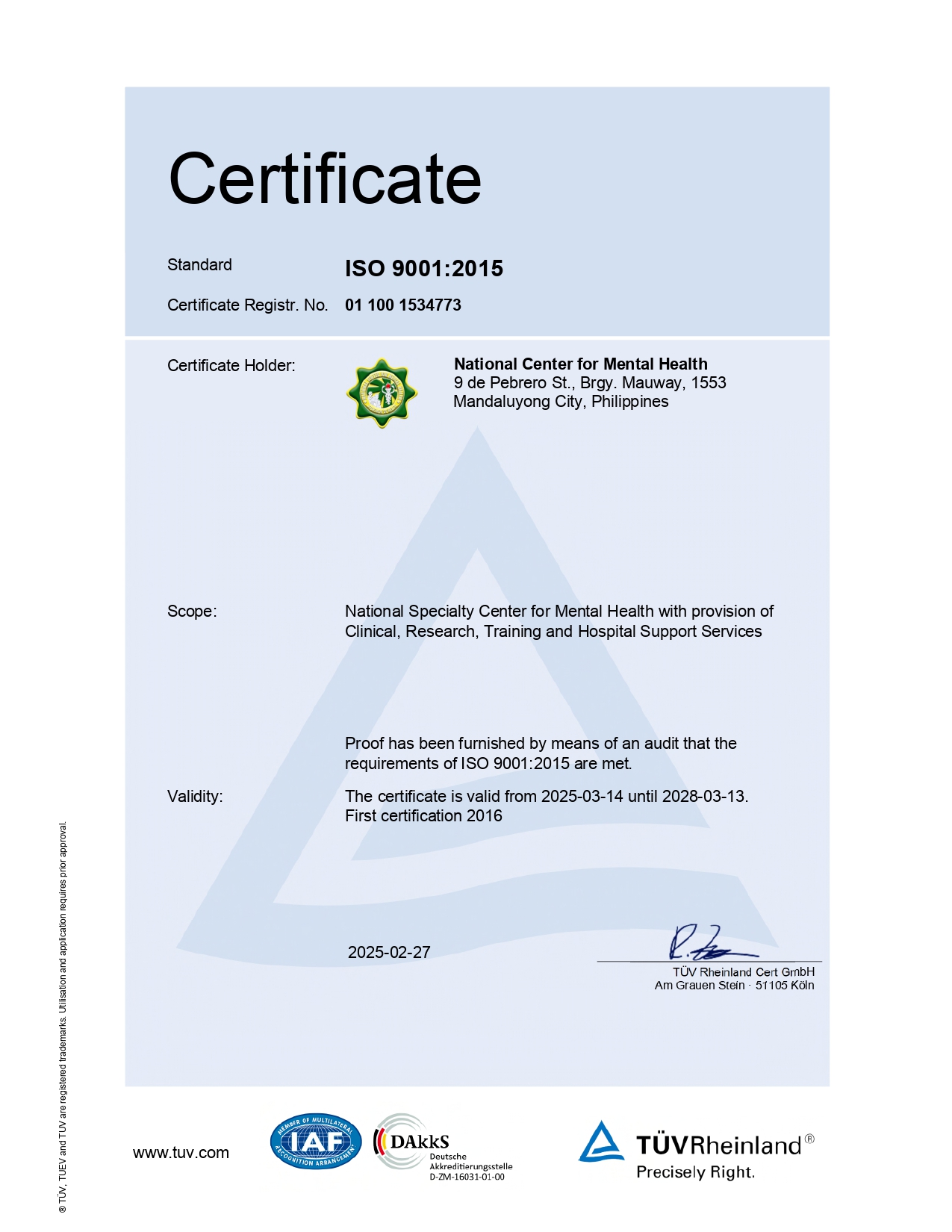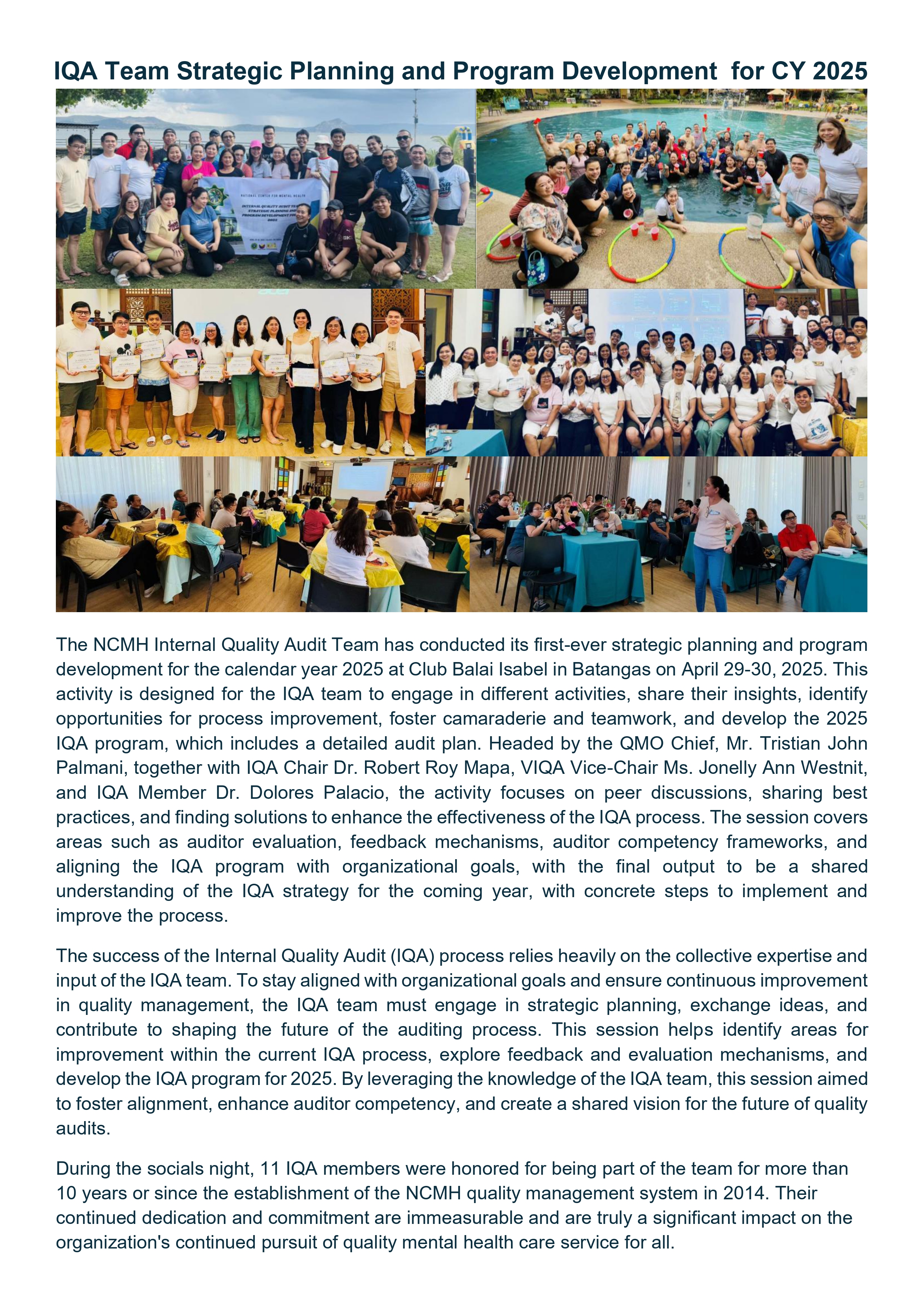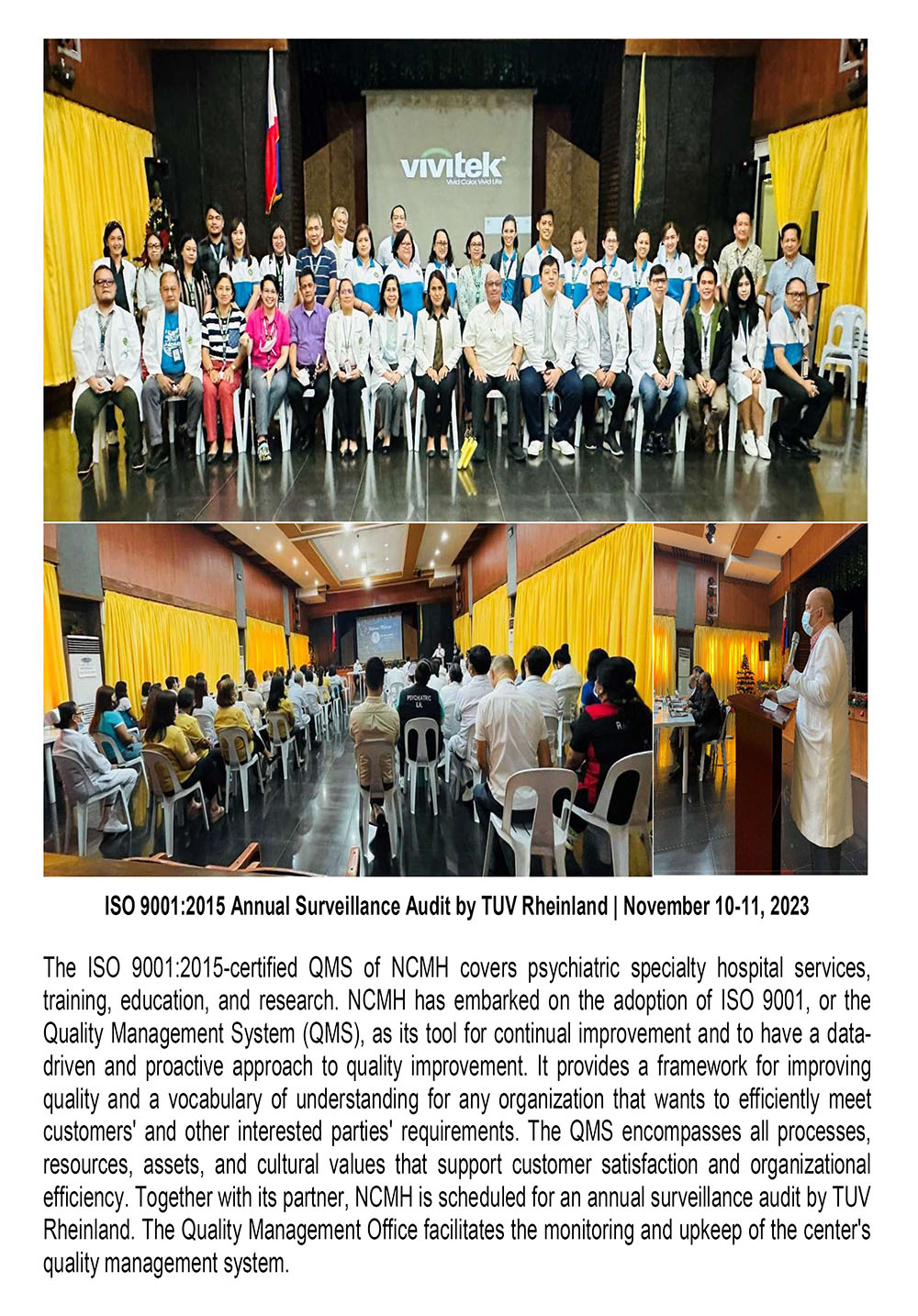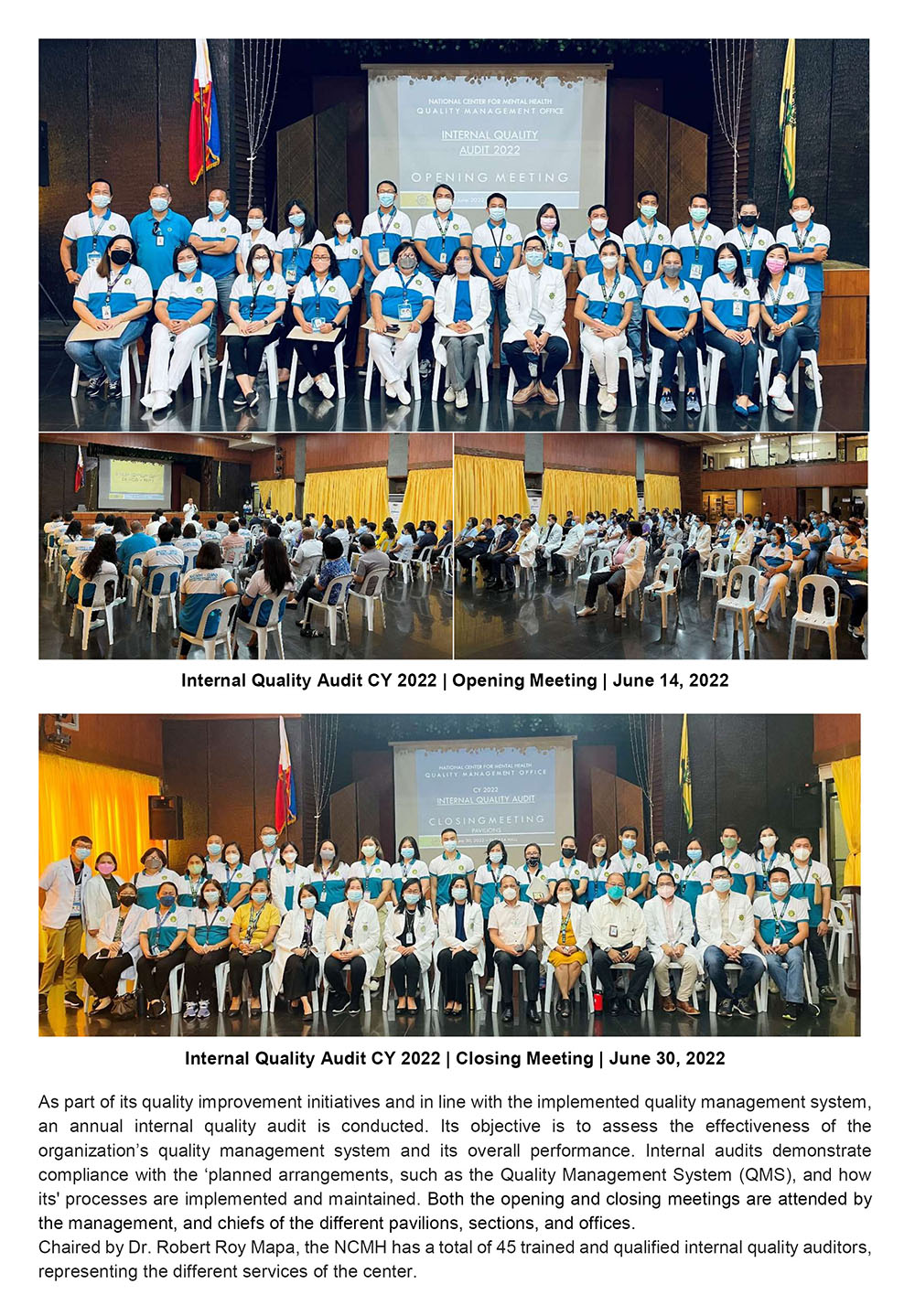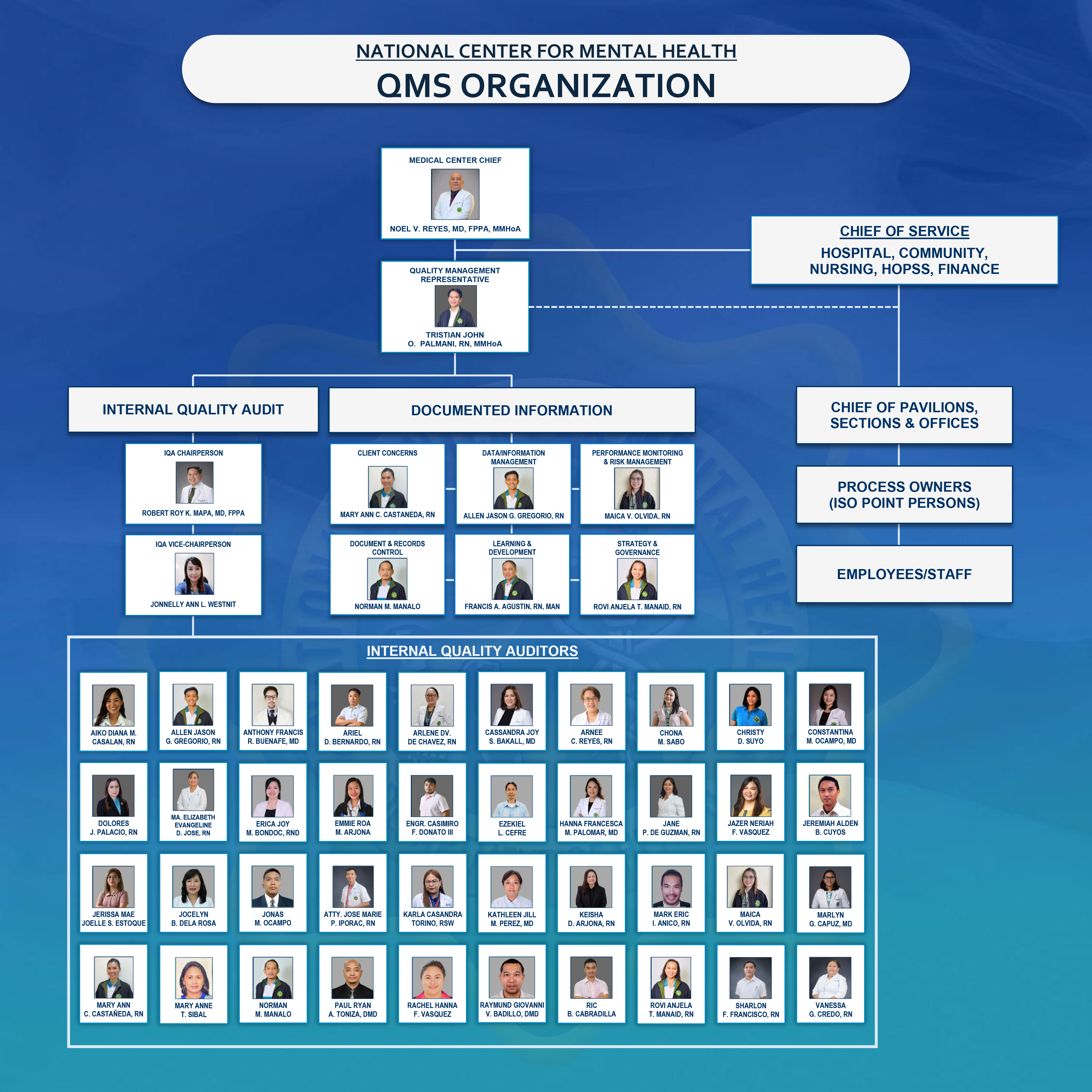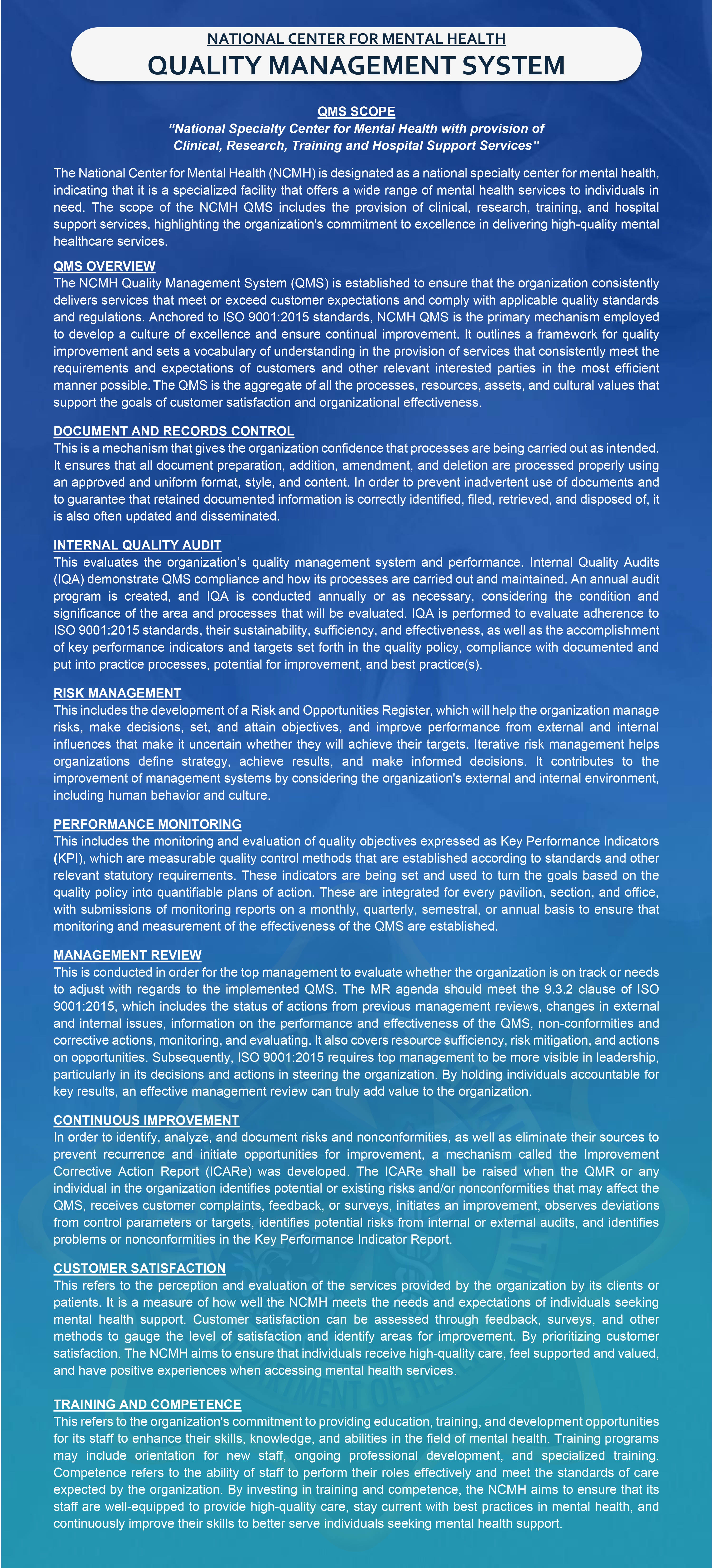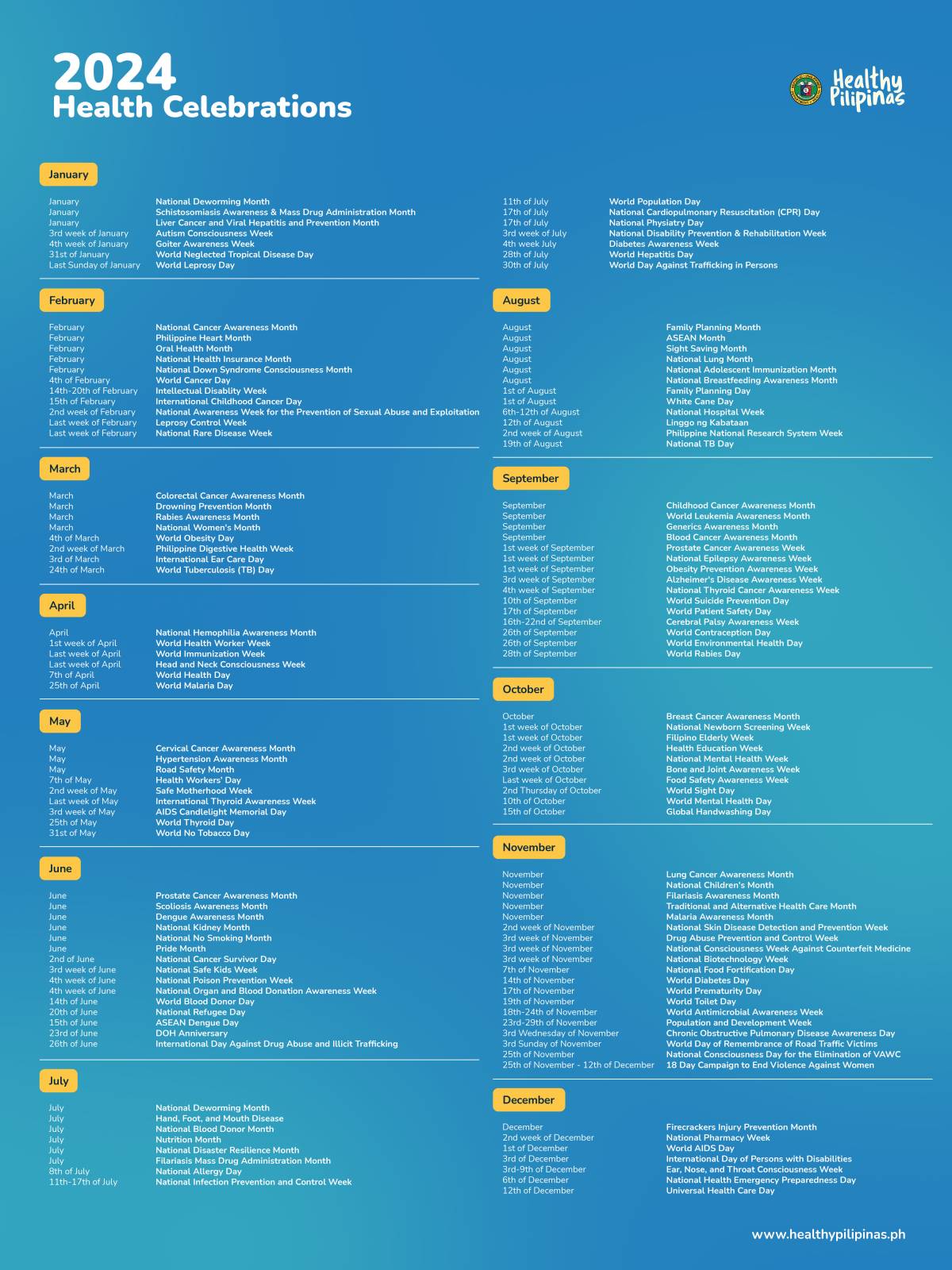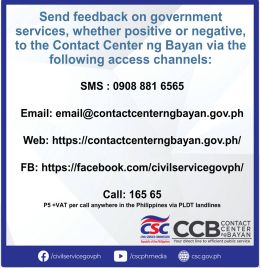Updates
NCMH is now ISO 9001:2015 Certified
The National Center for Mental Health, as the leader in providing mental health services in the country, is now ISO 9001:2015 certified. TUV Rheinland (TUVR) awarded the NCMH with the certification after a 2-day Transition Audit on November 23-24, 2017.
ISO 9001:2015 is the international standard that specifies requirements for a quality management system for organizations. An organization that is ISO 9001:2015 certified has demonstrated its ability to consistently provide products and services that meet requirements from its customers and regulators.
Headed by its Lead Auditor, Mr. Eric Santos, TUVR checked the center’s implementation of its quality management system and its conformance to the new version of the standard. All five major services including the top management were audited and were able to provide the documents and information that were required for ISO certification.
NCMH passed the quality audit with flying colors with zero non-conformity which means that the Center adheres and conforms to the international standards for all of its processes.
NCMH started its transition to ISO 9001:2015 from the previous ISO 9001:2008 standard in November 2016 through a Transition and Awareness Training. This was followed by a series of ISO related trainings and workshops to prepare the center and its personnel in the implementation of its quality management system aligned to the new version of the standard.
The Quality Management Team, who is the center’s front-runner in the implementation of its QMS, facilitated all ISO related activities including preparation of documents and checked the preparedness of all areas by conducting an Internal Quality Audit. Now that the center has achieved its goal to be ISO certified, the Quality Management Team will continue to monitor the implementation of the QMS and will be the leader in providing quality services. As stated in our Quality Policy, NCMH will continue to CARE, to EMPOWER and to EXCEL to all the clients we serve.
1st Internal Quality Audit CY 2017
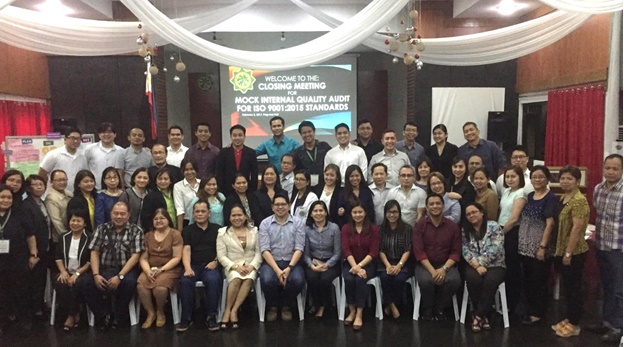 In line with the centers’ preparation towards transition to ISO 9001:2015, a series of Internal Quality Audit was conducted to check its conformance with the new standard. The first IQA CY 2017 for Wards and Pavilions took place last April 18, 19 & 20; while Sections and Offices were audited on May 16, 17 & 18, 2017. It was the first internal audit using the new standards, which focuses on the risk management with all the processes of the center.
In line with the centers’ preparation towards transition to ISO 9001:2015, a series of Internal Quality Audit was conducted to check its conformance with the new standard. The first IQA CY 2017 for Wards and Pavilions took place last April 18, 19 & 20; while Sections and Offices were audited on May 16, 17 & 18, 2017. It was the first internal audit using the new standards, which focuses on the risk management with all the processes of the center.
Present during the Opening and Closing Meetings are members of the EXECOM headed by Dr. Bernardino A. Vicente and the center’s Quality Management Representative Dr. Venus Serra-Arain, chief of different sections, head of pavilions, ISO point persons, members of the Quality Management Team and other process owners.
Conduct of Internal Quality Audit is done bi-annually as the primary tool to check the sustainability, adequacy and effectiveness of the center’s implemented Quality Management System. Second round of IQA will be conducted on August and September as a preparation for the transition audit tentatively scheduled on first week of October.
Comprehensive IQA Training for ISO 9001:2015
 As NCMH continues its journey towards transition to ISO 9001:2015, a Comprehensive Internal Quality Audit Training for ISO 9001:2015 was conducted last January 31 to February 3, 2017 at the Pag-asa Hall. The 3-day lecture and workshop and 1-day live audit was facilitated by Infoadvance attended by the centers current qualified internal auditors and new members of the IQA Team from all major services. A total of 47 personnel completed the training who are now part of NCMH Internal Quality Audit Team tasked to check the center’s conformity to the ISO Standards and other regulatory requirements.
As NCMH continues its journey towards transition to ISO 9001:2015, a Comprehensive Internal Quality Audit Training for ISO 9001:2015 was conducted last January 31 to February 3, 2017 at the Pag-asa Hall. The 3-day lecture and workshop and 1-day live audit was facilitated by Infoadvance attended by the centers current qualified internal auditors and new members of the IQA Team from all major services. A total of 47 personnel completed the training who are now part of NCMH Internal Quality Audit Team tasked to check the center’s conformity to the ISO Standards and other regulatory requirements.
The first 3 days of the training was a series of lectures and workshops to prepare all the participants in conducting proper internal audits. During the last day of the training, a live mock audit was conducted to chosen areas of the center for the participants especially the newly ones to experience conducting actual audits. The centers’ Quality Management Representative and other members of the EXECOM were also present during the Opening and Closing Meeting to show support and gratitude to the Internal Quality Audit Team.
With the goal of NCMH to be certified to ISO 9001:2015, this is just one of the trainings organized by the center to prepare the entire organization in its transition to adopt the new standard.
NCMH, 6 others obtains ISO 9001:2008 Certification
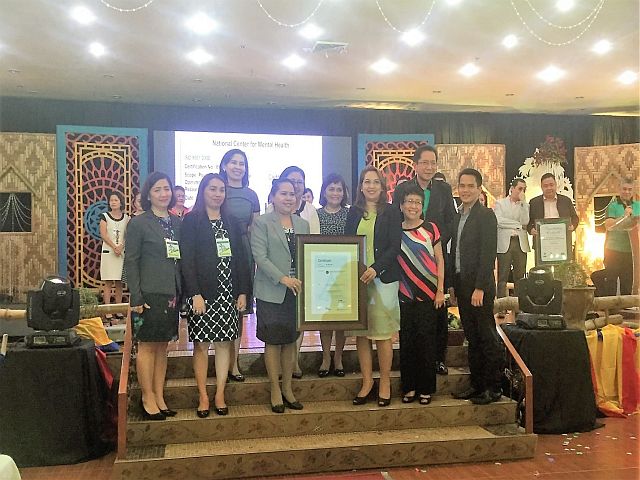 The National Center for Mental Health officially receives its ISO Certificate during the ISO Ceremonial Awarding held during the Department of Health 4th National Staff Meeting at Pearlmont Inn in Cagayan de Oro City on April 27, 2016. Secretary of Health Janette P. Loreto-Garin and Usec. Gerardo V. Bayugo witnesses the turning over of the certificate by TUV-Rheinland Philippines’s Ms. Melody M. Mokamad and Ms. Pinky Z. Villacrusis. Representing the National Center for Mental Health to receive the award are Dr. Venus Serra-Arain who is also the representative of Dr. Bernardino A. Vicente in the National Staff Meeting, Dr. Beverly A. Azucena, Ms. Clarita M. Avila, Ms. Rosalina M. Evasco, Ms. Lucia M. Trovela and Mr. Tristian John O. Palmani.
The National Center for Mental Health officially receives its ISO Certificate during the ISO Ceremonial Awarding held during the Department of Health 4th National Staff Meeting at Pearlmont Inn in Cagayan de Oro City on April 27, 2016. Secretary of Health Janette P. Loreto-Garin and Usec. Gerardo V. Bayugo witnesses the turning over of the certificate by TUV-Rheinland Philippines’s Ms. Melody M. Mokamad and Ms. Pinky Z. Villacrusis. Representing the National Center for Mental Health to receive the award are Dr. Venus Serra-Arain who is also the representative of Dr. Bernardino A. Vicente in the National Staff Meeting, Dr. Beverly A. Azucena, Ms. Clarita M. Avila, Ms. Rosalina M. Evasco, Ms. Lucia M. Trovela and Mr. Tristian John O. Palmani.
The Department of Health organized the ceremonial awarding for the newly certified DOH Hospitals and Attached Agencies in recognition for their efforts in acquiring the ISO 9001:2008 Certification. This year, seven hospitals/agencies was recognized in taking its part in setting the record for DOH as the first government agency under the executive branch to have a department-wide Quality Management System certified to ISO 9001:2008. These include Don Jose Monfort Medical Center Extension Hospital (Iloilo City), Philippine Orthopedic Center (Quezon City), Davao Regional Medical Center (Davao City), Amai Pakpak Medical Center (Marawi City), Gov. Celestino Gallares Memorial Hospital Tagbilaran City), Mayor Hilarion A. Ramiro Sr. Regional and Teaching Hospital (Ozamiz City) and National Center for Mental Health (Mandaluyong City).
NCMH, being one of the DOH-retained hospitals started its journey towards certification last March 2014 and obtain its ISO 9001:2008 Certification on December 2, 2015, certified by TUV-Rheinland. In line with its monitoring, surveillance audit will be conducted this coming June 1 & 2, 2016 to check the maintenance and sustainability of the hospital’s quality management system. NCMH’s ISO 9001:2008 Certification is valid until September 14, 2018, but the hospital will be braising for transition to ISO 9001:2015 as part of is continual improvement and reaching for a new heights.
NCMH pushes for ISO 9001:2008 certification
 The provision of quality health care to every Filipino is the central focus of the Aquino administration’s health policy. The policy is called Kalusugan Pangkalahatan or Universal Health Care and the Department of Health (DOH) has already taken several steps to achieve the administration’s goals to increase the public’s access to quality health care.
The provision of quality health care to every Filipino is the central focus of the Aquino administration’s health policy. The policy is called Kalusugan Pangkalahatan or Universal Health Care and the Department of Health (DOH) has already taken several steps to achieve the administration’s goals to increase the public’s access to quality health care.
To achieve the goals of Universal Health Care, the government will focus its efforts on three tasks. First of all, the government aims to protect Filipinos from the financial impact of health care by increasing enrollment in PhilHealth and to make claims processing at the agency more efficient through information technology. Secondly, the administration seeks to improve the public’s access to quality hospitals and health facilities through programs such as the Health Facility Enhancement Program. And lastly, Kalusugan Pangkalahatan seeks to allocate additional resources for efforts to help the country meet the health-related Millennium Development Goals.
Improving Access to Quality Hospitals and Health Care Facilities
Last December, the DOH announced that it was able to achieve ISO 9001:2008 certification. The DOH was the first government agency under the executive branch which was awarded this prestigious certification.
ISO stands for International Organization for Standardization and ISO 9001:2008 is a set of requirements for organizations to implement a quality management system.
Six government hospitals including the Philippine Children’s Medical Center in Quezon City and the Ilocos Training and Regional Medical Center in San Fernando City, La Union have already been successful in their efforts to achieve ISO certification.
In the announcement of the awarding of the ISO certification for the DOH, Health Secretary Enrique Ona said “being ISO-certified is a step towards excellence” the certification meant that the health agency was efficient since unnecessary processes were eliminated.
The Value of ISO 9001:2008 Certification for the National Center for Mental Health
In line with the thrust of the Universal Health Care to improve the public’s access to quality health care facilities, the National Center for Mental Health (NCMH) has also taken steps to become ISO 9001:2008 certified.
At the heart of the efforts of the hospital to be ISO certified is the implementation of a quality management system for NCMH. Through the system, well defined procedures are put in place to improve the quality of health care that the hospital provides its patients. This increases patient safety but it also benefits health care providers since the system provides them with guidance on what to do when accidents or other unforeseen events happen in the workplace.
The hospital’s efforts to achieve ISO certification will help it becomeready for any regulatory requirements and it puts in place policies that will ensure that quality is always monitored and that the hospital’s processes are continuously refined.
To help the hospital implement the quality management system which is important to achieving ISO certification, several people have been assigned the task of ensuring that the hospital’s processes and policies meet the requirements of the quality standard. The hospital’s administrators hope to clinch the ISO certification by the end of this year. With the world-class quality standards in place, the patients, employees, and administrators of the National Center for Mental Health stand to reap all of the benefits of this important aspect of the government’s mission to provide Universal Health Care to Filipinos.
What is ISO 9001:2008?
ISO 9001:2008 Quality Management System certification enables you to demonstrate your commitment to quality and customer satisfaction, as well as continuously improving your company’s operations. The internationally recognized quality management system standard is the preferred solution for organizations worldwide.
In November 2008 the International Organization for Standardization (ISO) introduced a revised Quality Management standard based on the same process model as the 2000 revision, with an emphasis on measuring customer satisfaction. The current version continues to emphasize compatibility with ISO 14001 - Environmental Management Systems.
The goal is for all organizations to seek continuous performance improvement. All requirements for quality management of the product or service are covered in ISO 9001:2008 which includes a quality planning requirement along with policies, objectives and quantifiable targets.
ISO 9001:2008 requires organizations to have a quality manual which includes the documented procedures or references to them. The manual must include a description of the sequence and interaction of the processes that make up the quality management system specific to your business. In addition, the scope of the system has to be clearly defined.
Overall, the effect of the requirements of the standard is to reduce the instances where documented procedures are mandatory (there are only six mandatory procedures) and to allow the organization the freedom to determine the type and extent of documentation needed to support the operation of the processes that make up the quality management system.
Benefits of ISO 9001:2008:
- Involves Top management in the improvement of the Quality management System.
- Facilitates the organization to become a customer-focused organization.
- Ensures sustained customer satisfaction by producing, delivering services and providing support functions that meet customer's needs and expectations.
- Increases the effectiveness and efficiency of the organization through continual improvement in systems and products /services quality.

